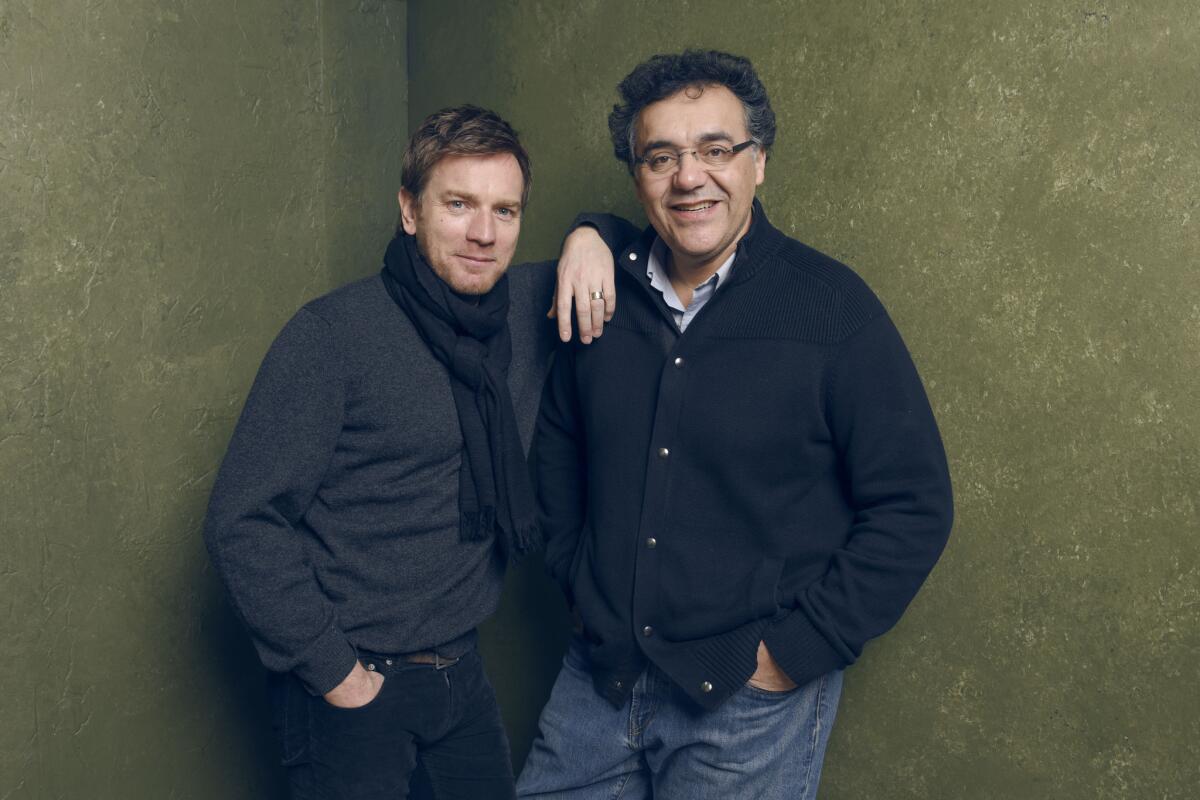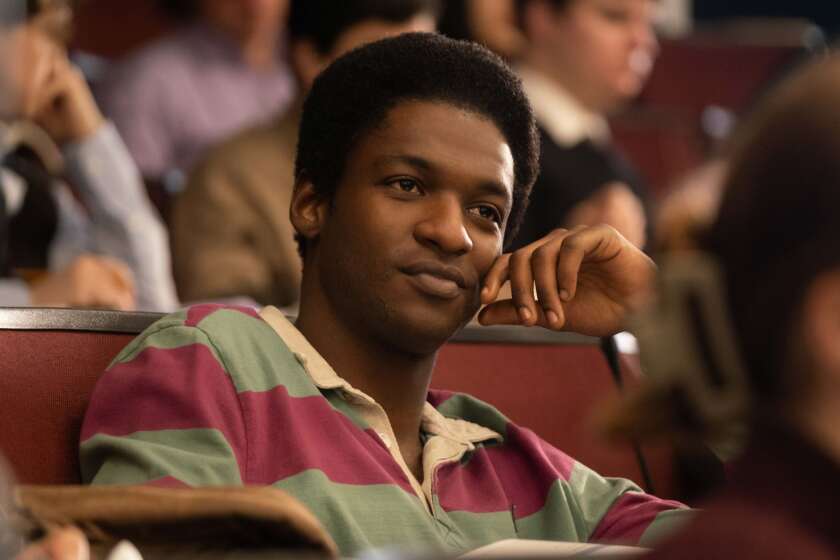Director Rodrigo García’s life echoes across biblical ‘Last Days in the Desert’
Director Rodrigo García is not a religious man, nor was his father, the Nobel Prize-winning author Gabriel García Márquez. So why he felt compelled to tell a story about Jesus’ 40 doubt-ridden days in the desert is a riddle he’s still trying to solve.
“I don’t know what organ of my body this film came from,” he confesses. “I kept asking myself, ‘What are you doing? A movie about Jesus?’ But I couldn’t get it out of my head.”
García’s movie “Last Days in the Desert,” premiered at Sundance last year and opens in Los Angeles on May 13. It’s a radical departure from his earlier, female-centric films — and from his HBO series about therapy, “In Treatment.”
Hushed, spare, intensely personal, featuring an appealingly human and vulnerable Jesus — and beautifully shot by multiple Oscar winner Emmanuel Lubezki — “Last Days in the Desert” isn’t your standard biblical epic. In “Last Days,” Jesus is called Yeshua, and he’s played by Ewan McGregor, who also plays his alter ego, “The Demon,” a.k.a. Satan.
At its heart it’s a story of fathers and sons. García invents a family Jesus encounters in the desert. They take him in, and Satan challenges him to resolve the problems that are tearing the family apart. There is a sick mother (Ayelet Zarer), a stern and stubborn father (Ciarán Hinds) and their teenage son (Tye Sheridan), who wants to escape from his father’s yoke and find his fortune in Jerusalem. Set against this father-son struggle is Jesus’ relationship with his silent Father, who has laid out a destiny for his chosen son.
“Yeshua needed to free this boy because he could not free himself,” García explains. One of the movie’s conceits is the sibling-like rivalry between Jesus and the duplicitous Satan, who tries to turn Jesus against his Father. Satan, the fallen angel Lucifer, has actually seen the face of God, and he holds this intimacy over Jesus, who never has.
García is talking about the film in one of the family homes in Cartagena where last year it was selected as the opening-night film of the Cartagena Film Festival. In tribute to his late father (affectionately known as “Gabo” to his legion of fans), the festival mounted a sidebar of some of Márquez’s favorite films.

Actor Ewan McGregor, left, and director/writer Rodrigo Garcia of “Last Days in the Desert.”
García keeps a low profile; even many who know his work, including such films as “Nine Lives” and “Albert Nobbs,” don’t realize that he is Márquez’s son. He’s never kept it a secret, but he’s been reticent to say too much about his father, never wanting to ride on his coattails.
Márquez wasn’t just any writer; the author of “A Hundred Years of Solitude” was a literary colossus, as iconic in his field as a Frank Sinatra or a Marlon Brando or a Michael Jordan. At his funeral in April 2014 in Mexico City, attended by the presidents of Colombia and Mexico, tens of thousands of mourners paid tribute.
“There were 10 years of interviews before people stopped asking me about my dad,” García recalls. “But everyone always assumed I didn’t want to talk about him. And then when I did junkets for ‘Albert Nobbs’ nobody asked anymore. And I felt a little sad.” Then, half-jokingly, he adds: “Maybe I made this movie so people would talk about him again.”
Female-centric films
When roundups of the most interesting independent filmmakers are made, García’s name often gets overlooked. Is it because his films have always focused, with uncanny empathy, on the lives of women?
Starting with “Things You Can Tell Just by Looking at Her,” followed by the masterly anthology “Nine Lives,” then “Mother and Child” and “Albert Nobbs” (the one movie he didn’t write himself), García has inspired a slew of great performances, sensitively constructing a cinematic world far from the testosterone-fueled, postmodern visions of the Tarantinos and Nolans.
------------
For the record
May 7, 3:06 p.m.: A previous version of this article referred to the film “Mother and Child” as “Mothers and Sons.”
------------
“I’m neither commercial nor hip,” García says with typically self-effacing humor.
“Last Days” is García’s own distinct, humanistic take on Jesus. It will not rile the faithful, as Scorsese’s “The Last Temptation of Christ” did. It does not indulge in the S&M spectacle of Mel Gibson’s “The Passion of the Christ.” It is not a solemnly pious epic like George Stevens “The Greatest Story Ever Told” or a fierce polemic like Pasolini’s “The Gospel According to St. Matthew.”
In the film the wily Demon, who delights in messing with Jesus’ head, compares God to a storyteller who’s trying to perfect the Earth by constantly writing and rewriting it, willing to start the universe all over just to change the shape of a branch.
“That was my riff on how artists work,” García notes. “They’re just insatiable. The art comes first. God would perfect the universe at the expense of everything else.” It’s Satan’s way of taunting Jesus with the idea that God doesn’t care about him, only with the story he’s been cast in.
It wasn’t until García was halfway through writing his screenplay that the parallels to his own life struck him.
“Both Yeshua and the boy are trying to find their destiny from under a powerful father. I’m not so blind I don’t see that.” But once he saw it, it became emotionally much harder to write: to keep the focus on his tale, not himself. “Writing the second half was exhausting.” Then he adds with a laugh, “but my father was not a silent God.”
García, the firstborn son of the globetrotting Márquez, had an unusually peripatetic childhood. He was born in Colombia, then raised in Mexico City, and between ages 8 and 14 lived in Barcelona with his dad, his mother, Mercedes, and his younger brother Gonzalo before returning to Mexico City for high school, then to Harvard for college.
“He was preoccupied with the impact his fame and success could have on us,” García says of his father. “That it could paralyze or crush us.”
The Márquez household was filled with his father’s left-wing artistic friends — the novelists Carlos Fuentes and Mario Vargas Llosa were regulars — and storytelling was prized above all. Instead of church on Sundays, García remembers garrulous lunches for more than a dozen people, where the taletelling would go on deep into the afternoon.
“My dad was always at home. He had no hobbies. He wrote from 9 to 2, and he engaged with others.” He says his own work ethic comes from his father. “My brother and I are the same, we can’t do anything but the task at hand. It’s impossible for me to take a vacation. “
García also inherited his father’s love of movies. As a young journalist, Márquez wrote frequently about films, and in the early days of his career, before “A Hundred Years of Solitude” sealed his fate as a novelist, worked on many screenplays. He prized the Italian neorealists, De Sica in particular. Truffaut’s “Jules and Jim” was his favorite film. He revered Kurosawa, particularly “Red Beard,” which he took his son to see many times.
Years later, Kurosawa wanted to make a film of Márquez’s “The Autumn of the Patriarch,” recast in medieval Japan. But to his dad’s disappointment, the project never got funded. Though many movies have been made from the stories and novels — few of them good — Márquez refused to let anyone film “A Hundred Years of Solitude.” He told his sons that after his death they were free to sell the rights if they needed to. The only way it could be adequately filmed, García concedes, is as a television miniseries. He’s not eager to see that happen.
“My favorite thing my father wrote or said is in ‘Love in the Time of Cholera’: ‘Nobody teaches life anything.’ I love that. Life trumps all. Reality is always better, bigger, more astonishing than anything. By comparison, ‘Life imitates art’ is foolish. Life imitates nothing. Life rules supreme.”
Márquez died while his son was editing “Last Days,” a film that, García admits, is haunted by the idea of death. It would be foolish to get too Freudian about the interweaving of autobiography and fiction in the movie; art is not therapy, and the mysteries of the creative process are best left hidden from the artist. Indeed, sometimes he is the last person to see what is standing in front of his eyes.
“It’s a testament how much we don’t see what we don’t want to see that it only occurred to me in the last few years that my father wanted to be a director,” García says later at his office in Culver City. “Which of course I knew my whole life. But it hit me: Oh, wait a minute! I am a director — which was his dream. It wasn’t until my 50s that I put it together.”
More to Read
Only good movies
Get the Indie Focus newsletter, Mark Olsen's weekly guide to the world of cinema.
You may occasionally receive promotional content from the Los Angeles Times.










